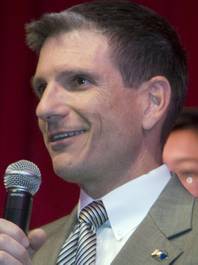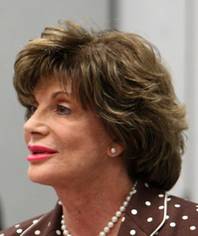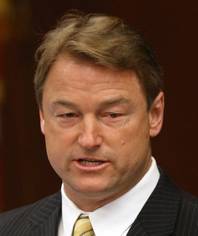Thursday, Sept. 23, 2010 | 2 a.m.
Sun coverage
The Bush-era tax cuts are set to expire at year’s end. Without congressional action, the taxes Americans pay on income, dividends and capital gains will rise, returning to late 1990s levels. The estate tax, which expired at the end of 2009, will also return, and tax credits for education and retirement will shrink.
Proposals for new tax rates could be unveiled in the U.S. Senate as early as today.
Although higher tax bills are rarely popular with the public, economists predict that extending the cuts — signed by President George W. Bush in 2001 and 2003 — would cost the federal government $4 trillion over the next decade and almost double the deficit.
The timing of the expiration of the cuts has forced a political and policy question on members of Congress and their challengers as Election Day approaches.
The Sun asked the members of Nevada’s federal delegation who are seeking re-election and their major-party challengers whether they support extending the tax breaks and if so, how they would pay for them.
Their answers, below, hew largely to party lines.
Democrats favor extending the cuts for individuals earning less than $200,000 a year and families earning less than $250,000 — what they refer to as the “middle class.” Republicans, meanwhile, generally support extending tax breaks for all Americans, including high-income earners.
President Barack Obama wants to extend cuts for all but the top two tax rates — individuals making more than $200,000 or joint-filers making more than $250,000.
But Republicans and some Democrats think tax cuts for the wealthy would stimulate the economy because the money saved would be used by business owners to grow operations and hire workers or by investors to bankroll new businesses. Democratic Reps. Dina Titus and Shelley Berkley agree this should be done, at least temporarily.
Senate
Majority Leader Harry Reid, Democratic incumbent:
Reid, who is in the driver’s seat on this legislation, said he supports extending the tax cuts for the middle class but not for higher earners.
“Whatever action we take, we should first agree that making the tax cuts permanent for middle-class families is the priority,” Reid said. “We should not hold middle-class families hostage to make sure that millionaires like Paris Hilton get another tax break.”
Reid said he will fight to prevent passage of a bill introduced by Republican leadership to permanently extend all the Bush tax cuts. Such a bill would cause a “massive explosion” in the nation’s deficit, Reid said.
Sharron Angle, Republican candidate:
Angle said she would vote to extend tax cuts for all income levels and would prefer to make the cuts permanent to encourage economic growth.
“We know that the tax cuts will increase revenue because of the individual’s increased ability to spend more of their money,” she said.
To offset the effect on the deficit, Angle suggested reducing government spending on non-discretionary items by 5 percent annually for five years, eliminating pork and returning stimulus money to the general fund.
3rd Congressional District
Rep. Dina Titus, Democratic incumbent:

Dina Titus
Titus favors permanently extending tax cuts for the middle class and temporarily extending tax cuts for the wealthy. More specifically, she would continue tax breaks for individuals who earn more than $200,000 and families earning more than $250,000 for one or two years, then re-evaluate the effect of those cuts on the economy and deficit.
“Right now, raising taxes in this economic climate could slow down a recovery, but at the same time, adding an additional $700 billion to our deficit through a permanent extension of tax cuts for the wealthiest 2 percent is unsustainable,” Titus said. “Growing our economy is the best way in the short run to reduce the deficit.”
Titus said lawmakers must rein in spending in the long-term, but did not offer any suggestions on where to cut spending.
Joe Heck, Republican candidate:

Joe Heck
Heck advocates a permanent extension of the Bush tax cuts for all income brackets.
“We must increase consumer demand in order to truly stimulate our economy,” Heck said. “The best way to do this is to allow individuals to keep more of their hard-earned dollars in their pockets.”
Heck supports tax breaks for wealthier Americans because “this is our small-business tax bracket,” he said, adding that Congress must do everything in its power to create an economic environment where small businesses can flourish.
Heck said Congress should cut stimulus funding, bank bailouts and “Obamacare” to keep the deficit in check.
1st Congressional District
Rep. Shelley Berkley, Democratic incumbent:

Shelley Berkley
Berkley said she would vote, as she has in the past, to extend tax breaks for the middle class. Because of the recession, she said she’s also willing to consider a temporary extension of tax cuts for wealthier citizens.
“I recognize there is a cost to extending these tax cuts,” Berkley said. “But with Nevada’s economy continuing to struggle, we must invest in helping middle-class families and employers — especially small businesses that are creating the majority of jobs — with incentives to hire and expand once again.”
Berkley did not offer suggestions for how to cut spending.
Kenneth Wegner, Republican candidate:
Wegner said he would extend tax cuts to all citizens regardless of income.
“We need to let Americans keep their money,” he said. “We shouldn’t discriminate against one group because they are becoming successful.”
Wegner said he would like to see the country impose permanent, flat rates that tax all people and businesses equally. Wegner proposed a 10 percent income tax, 2 percent national sales tax and 7.5 percent corporate tax for the country.
2nd Congressional District

Dean Heller
Rep. Dean Heller, Republican incumbent:
Heller supports extending all of the Bush-era tax cuts and offsetting the cost with cuts in spending. Congress could start by ending industry bailouts and stopping stimulus spending, he said.
“It’s not that people in this country are taxed too little, it’s the federal government that spends too much money,” Heller said. “It would be a mistake to raise taxes on anyone during a recession. This tax increase will catch approximately 750,000 small businesses, the economic lifeblood of our economy. Raising taxes in the middle of a recession will hurt our already fragile economy and will further impede economic recovery.”
Nancy Price, Democratic candidate:

Nancy Price
Price said she would vote to extend tax cuts for the middle class but not for wealthier Americans.
“If cutting taxes alone created jobs, we wouldn’t have the unemployment rate we have now,” Price said. “I want the top 2 percent to either pay more than 50 percent, or the rate when Republican Dwight Eisenhower was president, which was much higher. In order to get a break, this group (multinational corporations) must create jobs here; do manufacturing here; and pay their fair share.”
Sun reporters David McGrath Schwartz and Anjeanette Damon contributed to this report.



Join the Discussion:
Check this out for a full explanation of our conversion to the LiveFyre commenting system and instructions on how to sign up for an account.
Full comments policy